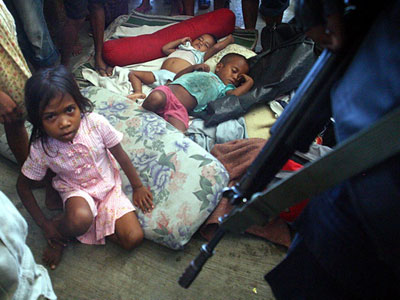(East Timor Problems) Population displacement
Timor-Leste: Population Displacement OCHA Situation Report No. 1
Ref: OCHA/GVA - 2006/0085
OCHA Situation Report No. 1
Timor-Leste - Population Displacement
"This report is based on information received from the United Nations Office in Timor-Leste (UNOTIL), and the OCHA Regional Office in Bangkok.
SITUATION
1. The security situation in Dili has deteriorated rapidly since 24 May when intensive fighting erupted between two factions of the East Timorese Army and then between the army and the police. The unrest began in March, when 595 of the army's original force of 1,400 went on strike claiming poor service conditions and ethnic discrimination by eastern-born commanders. At least five people were killed and dozens injured on April 27-28 when a protest rally in Dili in support of the rebels turned violent. Tens of thousands fled Dili fearing further unrest.
2. Australia has deployed approximately 1,800 troops in Dili (300 more then originally foreseen) and Malaysia approximately 200-250 troops. Malaysia will deploy an additional 250 troops and Portugal is likely to begin deployments this week.
3. While level of violence has slightly decreased since the deployment of Australian-led military force (25-26 May), youth gangs are reportedly pillaging and arsoning in several districts in Dili. It appears that these groups are Timorese from the west of the island (coming from the hills outside of Dili) that are seeking reprisal and targeting individuals originating from the east of the island. The situation remains calm in areas outside Dili, as reported by the UN border monitors.
4. UNOTIL estimates the number of IDPs in Timor-Leste at approximately 60,000 people. This number includes some 35,000 – 40,000 persons already displaced over the last several weeks and at least 25,000 displaced within or from Dili since 24 May (Population of Dili is 150,000). The number of displaced may be higher as displacement continues in Dili the movements of humanitarian agencies are constrained by the security situation.
5. While there are more than 100 identified IDP locations countrywide, according to reports from IOM, there is information available on at least three large IDP concentrations in Dili:
- 2 or 3 IDP camps managed by World Vision (Australia), with the two largest accommodating 13,000 and 10,000 IDPs;
- 4,000 IDPs accommodated in the UNOTIL compound and immediate vicinity.
6. Unconfirmed reports of attacks on IDPs at the locations where they are sheltering are being received from IOM, UNOTIL and the media.
7. UN Agencies and NGOs are to conduct an initial assessment of IDP camps in and around Dili today (29 May), security permitting. Such assessment has not been possible to-date due to the security situation and movement constraints.
8. Assistance to the IDPs is being coordinated by the Ministry of Labor, Social Welfare and Reintegration through the Humanitarian Action Group which will meet today (29 May) to agree on a list of priority sectors, and both financial and resource requirements that might be needed to address the situation.
9. Insecurity still impacts humanitarian operations, with only essential movement permitted in Dili and most of the humanitarian staff confined to their offices or residences. UNOTIL confirmed that a government food warehouse in Dili was looted on 28 May but Australian forces intervened promptly. According to World Vision, some NGO Offices have been targeted in the recent violence for supplies or other, unknown, reasons
10. Relocation of non-essential staff and family members of all UN staff continues. 58 UNOTIL staff (out of 149) and 76 Agency personnel (out of 162) have been evacuated to Darwin by 28 May 2006, together with 71 family members (both UNOTIL and UN Agency staff). Additional staff is expected to be evacuated over the next days. UNOTIL has established temporary offices in Darwin.
ASSISTANCE REQUIRED
11. From initial indications the food and water needs of the IDPs are relatively well covered, with food available at the WFP and Government warehouses. Sanitation and shelter are two key requirements. Heavy rains, expected in the Dili area, raise fears of possible malaria and dengue fever outbreaks.
INTERNATIONAL RESPONSE
12. OCHA has been in contact with the Office of the SRSG UNOTIL and offered assistance in public information, civil military liaison and humanitarian assessment and coordination support. OCHA is currently awaiting the outcome of the Inter-agency assessment and Humanitarian Action Group meeting at which requirements will be discussed.
13. OCHA is in close contact with the Office of the SRSG UNOTIL in Dili, and the Regional Office for Asia and the Pacific in Bangkok and will revert with further information as it becomes available. This situation report, together with further information on ongoing emergencies, is also available on the OCHA Internet Website at http://www.reliefweb.int/. "
Tel.: +41-22-917 12 34
In case of emergency only: Tel. +41-22-917 20 10
Desk Officer:
Ms. Megan Gilgan (in GVA) direct Tel. +41-22-917 1558
Press contact:
(in GVA) Ms. Elizabeth. Byrs direct Tel. +41-22-917 2653

